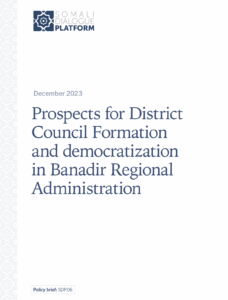Summary
- Rapid turnover and security threats have rendered Banadir local governance unstable. Conducting a district council formation process in Banadir region (which equates to the 17 administrative districts of Mogadishu) has been a challenging prospect. Over the past two decades, rapid leadership turnover (or absence of leadership altogether) in Banadir Regional Administration (BRA), contestations within the dominant clan and expectations of those who see the city as a ‘national’ capital, coupled with chronic insecurity and the ongoing threat of al-Shabaab, has made it difficult to establish stable governance practices. Against this backdrop, this policy paper explores the options available to BRA for expanding local democratisation and forming district councils.
- The presence of federal authorities and clan dynamics limit BRA accountability to citizens. BRA sits at the centre of a multifaceted nexus of governance factors, encompassing—among other elements—the Federal Government of Somalia (FGS) and local clan dynamics. In particular, the fact that BRA is the FGS’s principal revenue source has been a key factor in the federal leadership displaying no inclination to transfer governance authority. This is reinforced by the federal leadership’s power to appoint BRA’s governor and deputy governors, resulting in a governance structure in which there is no direct accountability to residents.
- The improving security situation and the calls for accountability and representation in Mogadishu, accentuates the need for parliament to decide on one of the three governance structures recommended for Mogadishu. With the decline in al-Shabaab’s influence and the resultant improvement in Mogadishu’s security prospects, it appears inevitable demands for an elected council will continue to grow. Thus, the current parliament must, first and foremost, select one of the three governance structures recommended by constitutional bodies—namely, designating Mogadishu/Banadir: 1) a federal district; 2) a Federal Member State (FMS); or 3) a capital city within an FMS. This decision should be driven by bipartisan cooperation and objective assessment, rather than the political opportunism that has previously impeded reform efforts.
- On the status question, the current BRA advocates for the “Berlin Model” as the framework for determining the final status of Mogadishu, the capital city of Somalia. In this model, the BRA would function dually as a federal member state, similar to Somalia’s other five states with adequate representation in both houses of parliament, while also serving as the capital city of the nation.
- The current BRA favours a top-down approach in the formation of a new regional governance structure, believing it to be a quicker and more straightforward path to implementation that aligns with the existing clan power-sharing dynamics within Banadir, home to over two million inhabitants. This approach, according to BRA, is not only expedient but also aims to cause the least disturbance to the established order, thereby ensuring continuity and stability within the intricate social fabric of the region.
- Substantive governance reforms will require a considered, multipronged approach involving a robust legal framework, the political will for local elections, and fairer, more transparent revenue reallocation. It also means ensuring representation encompasses both Mogadishu’s local communities—including internally displaced populations and recent migrants—and all Somalis who view Mogadishu as their capital. Drawing on history, the 2008 attempt at district council formation—an inclusive model, crafted amid considerable turbulence—could act as a starting point.
- The momentum for democratisation in Banadir is palpable, with the constitution, historical models and public sentiment all converging in this direction. The focus should therefore be on meticulous planning and effective strategies that ensure a democratic transition is neither delayed nor subject to avoidable complications.
Find the Somali version of this briefing here.




